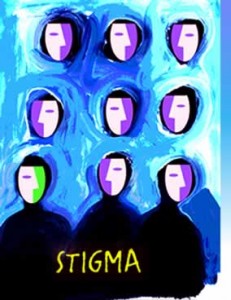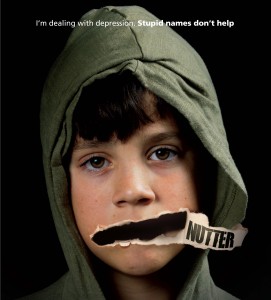Last fall, I wrote a proposal advocating for the creation of a suicide prevention program at my university for my scientific and technical writing class. While researching for my proposal, I came across the concept of stigma and how stigma negatively affects help seeking behaviors in college student populations. Once again, as I am researching and writing for my blog posts, I have noticed that stigma  is a recurring issue in many topics, specifically health. Even in the 21st century, stigma is still prevalent and associated with mental health, sexual orientation, infectious diseases, and addiction. Stigma is a roadblock for seeking help and being able to be a free person. It stops individuals from getting the treatment that they need or deserve and sometimes it even affects the effectiveness of a treatment. For example, even today stigma is a barrier to HIV testing and treatment despite the various medical advances that have been made in diagnosing and treating the virus.It is astonishing how many people are afraid of going to their doctor’s office and taking a test that may save their life. Stigma can be erased from society, and it is up to us to erase it completely. A world without stigma can lead to much healthier lives.
is a recurring issue in many topics, specifically health. Even in the 21st century, stigma is still prevalent and associated with mental health, sexual orientation, infectious diseases, and addiction. Stigma is a roadblock for seeking help and being able to be a free person. It stops individuals from getting the treatment that they need or deserve and sometimes it even affects the effectiveness of a treatment. For example, even today stigma is a barrier to HIV testing and treatment despite the various medical advances that have been made in diagnosing and treating the virus.It is astonishing how many people are afraid of going to their doctor’s office and taking a test that may save their life. Stigma can be erased from society, and it is up to us to erase it completely. A world without stigma can lead to much healthier lives.
What exactly is stigma? According to Merriam-Webster, Stigma is “a mark of shame or discredit.” Throughout history, mental disorders and many diseases specifically infectious, have been associated with stigma and stigma often leads to discrimination. For example, In a village called Melmangalam in Periyakulam, Tamil Nadu in India, individuals who are diagnosed with certain diseases are locked into rooms, have to bathe in separate areas, and even eat with separate utensils. Even after being cured, sometimes people cannot find employment, leading to poverty and feelings of hopelessness. For fear of facing discrimination from family and friends due to stigma, many people are silent about their conditions. By avoiding getting help for his or her condition, an individual can negatively impact his or her health and the health of others.
I am a huge fan of awareness campaigns because I really do believe education and knowledge are  the key to improvements in society. Since mental health is largely associated with stigma, to combat mental health stigma, it is an important develop a personal connection with the community. A local event such as an awareness concert can be planned in association with local psychologists, psychiatrists, mental health organizations, and community health workers. This would be a perfect venue to educate the community with real facts about mental health disorders and the stigma that is associated with it. It is also shown that education is effective in reducing stigma. At this event, organizations or individuals can speak about stigma and its negative impacts on our society and our future. Real life stories about people around the world or in a community being affected by stigma can also be shared at this event either in person or through some type of medium such as a video, or even a skype call. Social Media should be used to spread the information about the event and how people can get more involved. In order to advertise the overall message of the event, organizers can post signs and posters with facts around local neighborhoods and community centers. These messages can influence and inform individuals in a community. The best way to fight against stigma is to ultimately acknowledge it and to take action. Unfortunately, stigma still exists in society today and it is detrimental to the health of many individuals. It is important to stomp out the stigma in society today!
the key to improvements in society. Since mental health is largely associated with stigma, to combat mental health stigma, it is an important develop a personal connection with the community. A local event such as an awareness concert can be planned in association with local psychologists, psychiatrists, mental health organizations, and community health workers. This would be a perfect venue to educate the community with real facts about mental health disorders and the stigma that is associated with it. It is also shown that education is effective in reducing stigma. At this event, organizations or individuals can speak about stigma and its negative impacts on our society and our future. Real life stories about people around the world or in a community being affected by stigma can also be shared at this event either in person or through some type of medium such as a video, or even a skype call. Social Media should be used to spread the information about the event and how people can get more involved. In order to advertise the overall message of the event, organizers can post signs and posters with facts around local neighborhoods and community centers. These messages can influence and inform individuals in a community. The best way to fight against stigma is to ultimately acknowledge it and to take action. Unfortunately, stigma still exists in society today and it is detrimental to the health of many individuals. It is important to stomp out the stigma in society today!


